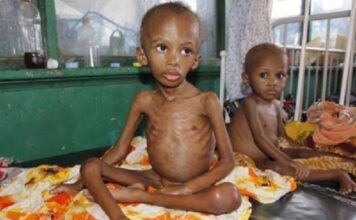Doctors Without Borders has expressed concern over the growing number of malnourished children in the northern region of the country, emphasizing that they are dying in large numbers.
The organization stated that their healthcare facilities have experienced a significant rise in admissions of severely malnourished children with life-threatening conditions in recent weeks, surpassing last year’s figures by more than 100% in some areas.
This development is seen as an alarming sign of an early peak in the lean season and the accompanying increase in acute malnutrition that is typically expected in July. This information was conveyed in a press release issued by the humanitarian NGO on Tuesday.
“We are resorting to treating patients on mattresses on the floor because our facilities are full. Children are dying. If immediate action is not taken, more lives hang in the balance. Everyone needs to step in to save lives and allow the children of northern Nigeria to grow free from malnutrition and its disastrous long-term if not fatal, consequences,” stated the MSF’s Country Representative in Nigeria, Dr Simba Tirima.
The organization urged Nigerian authorities, international groups, and donors to promptly diagnose and treat malnourished children to prevent complications and deaths. They also encouraged engaging in continuous, long-term efforts to address the root causes of this pressing issue.
“We’ve been warning about the worsening malnutrition crisis for the last two years. 2022 and 2023 were already critical, but an even grimmer picture is unfolding in 2024. We can’t keep repeating these catastrophic scenarios year after year. What will it take to make everyone take notice and act?” added Tirima.
In April 2024, the number of severely malnourished children with complications admitted to the MSF inpatient therapeutic feeding centre in Maiduguri, northeast Nigeria, reached 1,250 – twice as many as in April 2023, highlighting a concerning surge in malnutrition cases.
“Forced to urgently scale up capacity, by the end of May, the centre accommodated 350 patients, far surpassing the 200 beds initially designated for the peak malnutrition season in July and August.
“Also in the northeast, the MSF-operated facility in Bauchi state’s Kafin Madaki hospital recorded a significant 188 per cent increase in admissions of severely malnourished children during the first three months of 2024 compared to the same period in 2023.
“In the northwestern part of the region, in Zamfara state, the inpatient centres in Shinkafi and Zurmi have received up to 30 per cent more monthly admissions in April compared to March. Talata Mafara’s facility saw about a 20 per cent increase in the same period.
“Similarly, MSF inpatient facilities in major cities like Kano and Sokoto are also reporting alarming surges, by 75 and 100 per cent respectively. The therapeutic feeding centre in Kebbi state also documented a rise of more than 20 per cent in inpatient admissions from March to April 2024,” the organisation mentioned.
The situation is dire, yet the overall humanitarian response is falling short, and other non-profit organizations working in the region are also struggling to cope with the crisis, feeling overwhelmed by the sheer scale of the problem.
“The United Nations and Nigerian authorities issued an urgent appeal in May for $306.4m to address the pressing nutritional needs in Borno, Adamawa, and Yobe states. Yet this will be insufficient, ignoring as it does other parts of northern Nigeria where needs also outweigh the current capacity of the organisations to respond sufficiently.
“The catastrophic nutritional situation seen in recent years in northern Nigeria calls for a bigger response. Persistently excluded from the formal humanitarian response, reductions in the already limited funding available for the northwest have also dangerously affected the provision of crucial therapeutic and supplementary food.
“These supplies were completely unavailable in Zamfara for the first four months of this year and are now only available in lower quantities. This reduction has meant that it is only possible to provide treatment for more severe malnutrition cases, compromising an effective response that also addresses malnutrition earlier in its progression and avoids exposing children to a higher risk of mortality.
“We are alarmed by the reduction in aid at these critical times. Reducing nutritional support to only severely malnourished children is akin to waiting for a child to become gravely ill before providing care.
“We urge donors and authorities to increase support urgently for both curative and preventive approaches, ensuring that all malnourished children receive the care they desperately need.”
